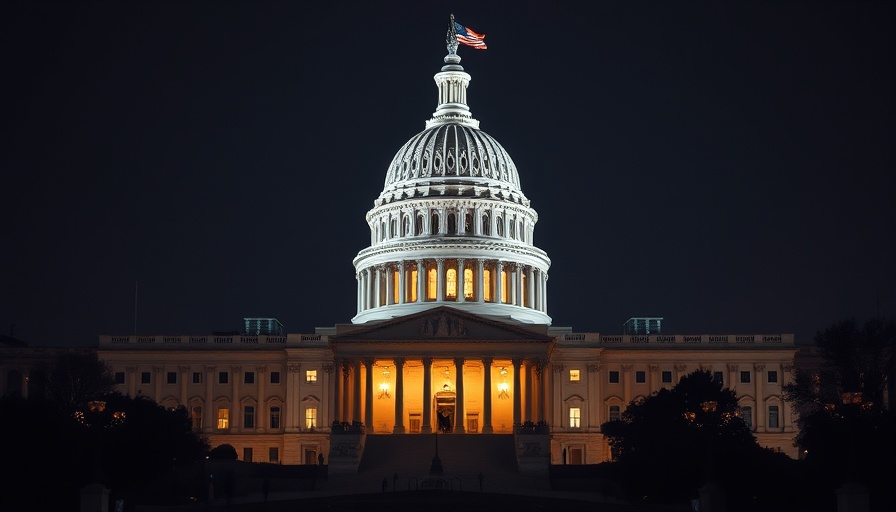
Understanding Government Shutdowns: Why They Happen
The imminent threat of a government shutdown looming on March 14, 2025, sheds light on the recurring issue of political impasses in the U.S. government. Government shutdowns occur when Congress fails to pass appropriations bills or the president declines to sign them, resulting in the withholding of funds necessary for federal operations. This recurring cycle of political brinkmanship not only reflects the complexities of legislative negotiation but also underscores the significant impacts on federal services, businesses, and citizens.
The Unseen Effects on Healthcare Services
For those in the healthcare sector, particularly concierge medical practices, the implications of a shutdown can be acute. If a shutdown occurs, critical functions often get delayed, including tax processing, which can impact patients' ability to pay for services. As the government grapples with funding, healthcare services are disrupted—leading to delayed grant reviews, hindered program planning, and potential interruptions in telehealth capabilities. Navigating these uncertainties necessitates strategic planning, especially for concierge practice owners aiming to position their services as indispensable within the community.
The Political Landscape: New Dynamics Affecting Funding
One significant factor complicating negotiations this time is the involvement of the newly inaugurated Department of Government Efficiency, colloquially referred to as DOGE, led by Elon Musk. This agenda, which advocates for significant cuts to federal employment, raises provocative questions: Does the GOP truly seek to avert a shutdown, or do they view the potential furloughs as a means to further their goals of reducing government size? These dynamics introduce an element of uncertainty not only for government employees but also for medical practices that rely on federal funds and services.
A Historical Perspective: Lessons from Past Shutdowns
Historically, government shutdowns have illustrated the volatility of governance in America. Each instance disrupts public confidence in the legislative process, as seen in previous shutdowns that have led to substantial public pushback and economic repercussions. The historical context provides a lens through which we can understand the current predicament and anticipate future responses. For concierge medical practices, this historical precedent serves as a reminder of the importance of fiscal prudence and adaptability to ensure business continuity.
Impacts on Citizenry: The Broader Economic Repercussions
As the clock ticks down to the March 14 deadline, awareness of the broader economic implications intensifies. Federal furloughs could ripple through communities, affecting not only those directly employed by the government but also the local economy as services slow. Reports indicate that past shutdowns have cost the economy significantly, including disrupted public services and lost economic activity. For concierge practices, understanding these ramifications means being prepared to assist patients who may find themselves in precarious situations due to government dysfunction.
The Possible Outcomes: Can Compromise Be Reached?
The political landscape is fraught with tension, but the potential for compromise exists. The House has passed a bill aimed at extending funding until September, but it remains uncertain if it will garner the necessary support in the Senate. House Speaker Mike Johnson faces a unique challenge in uniting factions within the party and across the aisle, which could lead to unexpected outcomes. Concierge practice owners must remain vigilant on these developments, as the financial stability of their practices may be contingent on the resolution of this ongoing political tussle.
Taking Proactive Steps: Strategies for Practice Resilience
In light of potential disruptions, it is imperative for healthcare providers to develop robust contingency plans. This may involve diversifying revenue streams, proactively managing patient communications, and preparing to adjust operational strategies in response to shifts in government service availability. By staying informed and adaptable, concierge practices can better weather the fiscal storm that a government shutdown could bring.
Conclusion: Where Do We Go from Here?
This situation presents not merely a political challenge but also an opportunity for strategic growth. As the deadline approaches, now is the time for practice owners to reinforce their financial strategies and enhance their service offerings to meet evolving patient needs. Engaging with local patients and fostering strong community ties could pave the way for resilience in the face of governmental uncertainties. With the right preparations and a focus on patient-centered care, the potential disruptions can be transformed into opportunities for innovation and growth.
As the clock ticks down, I encourage you, as a member of the concierge practice community, to engage proactively with your financial and operational strategies to positioned best for the evolving landscape that follows this critical deadline. The commitment to both your practice and it’s patients will surely pay off in the long run.
 Add Row
Add Row  Add
Add 






Write A Comment